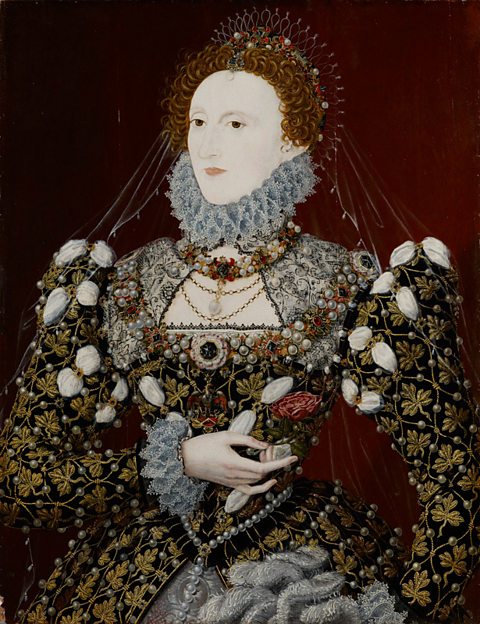Elizabeth and marriage

Elizabeth is the only English queen never to marry. MPsMembers of Parliament. and the Privy CouncilA group of senior politicians who advise the monarch. expected her to marry in order to secure the successionInheriting or taking up a position or title., and many foreign princes and English nobleSomeone of high rank with a title. wanted to marry her. She kept her thoughts on the subject private, but we can speculate as to why she never married. Some historians think she chose not to marry in order to protect Englandâs security; she wanted to remain independent of any foreign influence which marrying a foreign prince would have brought.
She kept everyone guessing on the subject of who she might marry but never did. This had advantages and disadvantages.
What were the advantages and disadvantages of Elizabeth not announcing a marriage?
Advantages
Staying single meant that Elizabeth could keep sole control of English affairs, namely government and religion. Elizabeth had a range of suitors from different countries. Her refusal to choose between them allowed her to keep her options open in foreign affairsThe policy of dealing with other countries or with overseas activities., whilst at the same time this enabled her to play countries off against each other making her a strong negotiator. She remained the focus of all power since there was no apparent successor.
Disadvantages
Ongoing uncertainty over who would inherit the throne had the potential to lead to plots and attacks to overthrow Elizabeth. For example plots from foreign, CatholicThe Church in Western Europe before the Reformation. The Pope was head of the Church. A member of the Roman Catholic Church. powers, such as Mary, Queen of Scots. The Privy Councillors and MPs were frustrated because the succession wasnât settled and they felt this made the country vulnerable.
Suitors
- Robert Dudley - Dudley, the Earl of Leicester, was an ambitious, good looking courtier. Elizabeth spent a lot of time with him and people thought they were in love, but there was a big problem: he was already married. When his wife was found dead there was a scandal and rumours circulated. This led Elizabeth to withdraw from Dudley as her reputation and position as queen were threatened.
- King Philip of Spain - In 1559, King Philip proposed to Elizabeth. He was a Catholic who had been married to Mary, Elizabethâs sister. MPs were not in favour of this allianceA union formed for mutual benefit, especially between countries. for fear of causing religious unsettlement and creating a foreign influence in government. Elizabeth cautiously rejected this offer.
- Archduke Charles - In 1567 Elizabeth considered marrying Archduke Charles of Austria but his Catholic faith meant there were the same religious differences as with King Philip of Spain, and in the end there was no match.
- Francis Duke of Alencon - Marriage negotiations went on for nearly a decade with Francis, who was heir to the French throne. There were many political advantages to be gained from this alliance, for example influence over French policy in the Netherlands, and Elizabeth used this to her advantage. However, Francis died in 1584 and after that Elizabeth was destined to be alone.
The "Virgin Queen"
Elizabeth emphasised her âVirgin Queenâ image portraying herself as a monarch who put the stability and security of England before her personal happiness. She would not marry anyone who might jeopardise Englandâs position.
More guides on this topic
- The Elizabethans overview - Edexcel
- Queen Elizabeth I's early rule quiz
- Elizabethan Religious Settlement - Edexcel
- Queen Elizabeth I's Religious Settlement quiz
- Challenges to Elizabeth's rule - Edexcel
- Challenges to Queen Elizabeth I's rule quiz
- Life in Elizabethan England - Edexcel
- Life in Elizabethan times quiz
- The Elizabethans - exam preparation - Edexcel